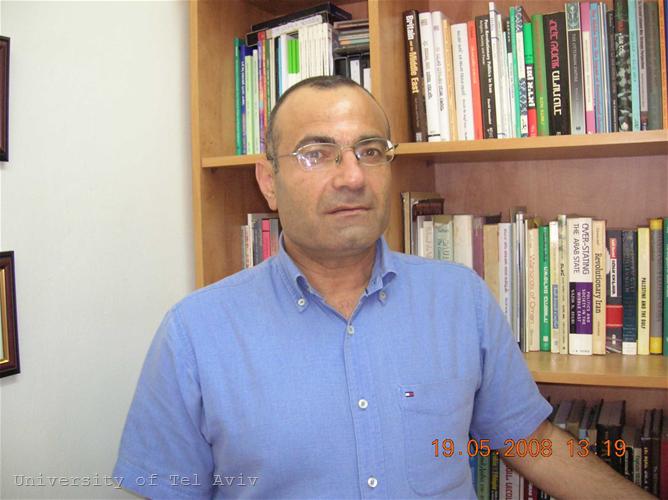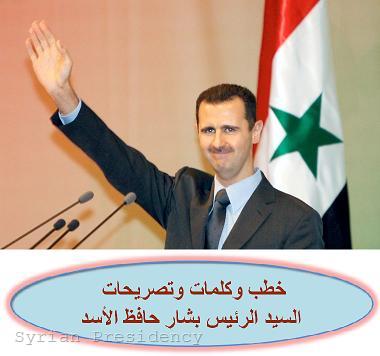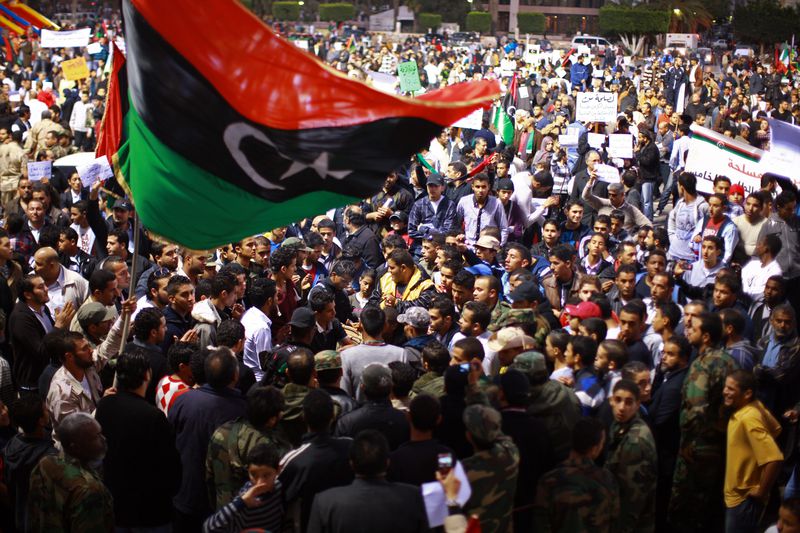The West's fading influence
Adelina Marini, August 28, 2011
 Unlike the wars in Afghanistan and Iraq the situation with the Arab Spring caught the West off guard. No one expected it, no one had been prepared. It is no accident that I mention Afghanistan and Iraq in one sentence with the Arab Spring. In the first case we are talking about "enforcing" of democracy from the outside and in the second about a voluntary outburst for democracy from the inside. By the way, in the first case too we can talk about a lack of solid preparation - a fact that was recognised much later. The West, the United States in particular, had not taken into account that providing freedom and democracy to peoples that had been victims of dictatorship and had no idea what a system of state was, was a great risk not only for the security of the country in question but for the region it is situated in.
Unlike the wars in Afghanistan and Iraq the situation with the Arab Spring caught the West off guard. No one expected it, no one had been prepared. It is no accident that I mention Afghanistan and Iraq in one sentence with the Arab Spring. In the first case we are talking about "enforcing" of democracy from the outside and in the second about a voluntary outburst for democracy from the inside. By the way, in the first case too we can talk about a lack of solid preparation - a fact that was recognised much later. The West, the United States in particular, had not taken into account that providing freedom and democracy to peoples that had been victims of dictatorship and had no idea what a system of state was, was a great risk not only for the security of the country in question but for the region it is situated in.
Even worse is when totalitarian militarised regimes fall, especially with a very bad timing. In times of economic prosperity (before the crisis of 2008) the US was easy in increasing its debts in order to participate everywhere where a major conflict was taking place. The European Union, on its part, was too busy with its own institutional building and was not willing to pay attention to conflicts. Now though, under the burden of huge debts and difficult political environment Washington left Libya and the Arab Spring to Europe by choosing to take part just for the sake of participation.
The EU saw an opportunity in this but proved to be unprepared for it - unprepared for the scale, especially after it had to act on two fronts - inside with the hundreds of thousands of migrants coming in flocks, and outside with the neighbourhood in which billions had already been invested but yet more need to be infused in order to ensure stability and restore normal trade flow. In spite all that though, no matter how strange this might sound, the EU looked more united in what had to be done in the Mediterranean than the US.
The US fell into isolationism
One of the reasons for the US to open to the world with the decision to get involved in World War I was that it was high time to quit isolationism and the country to take its deserved place in forming global processes. The process of opening went on vehemently and can be remembered mainly with military participation - the two world wars, the atom bomb in Hiroshima and Nagasaki, the war in Vietnam, the Cold War, the two wars in Iraq, Afghanistan. This proactive approach of the US made the country the super power of the 20th century. Undoubtedly.
Everything, however, has a price and it is not being measured in money only. Since 2008 Washington has to tackle not only the consequences of the global financial and economic crisis, in which it is a main participant, but also the heavy burden of the unsuccessful wars in Afghanistan and Iraq that had drowned the country in debts and bad image around the world but especially in the Muslim world. This is the reason why President Barack Obama preferred to look indecisive in the eyes of his political opponents in Washington but to act cautiously with the first buds of the Arab Spring - Tunisia and Egypt.
His economic policy but especially his foreign policy turned into a centrepiece of the Republican party's criticism in the race for the presidential elections in the US in 2012. But it was the behaviour of the republican presidential candidates that appeared to be the strongest proof that the global super power is going back to isolationism.
The New York Times quotes the reactions of some of the republican presidential nominees that clearly demonstrate insecurity - which is the right strategy at the moment. For example, one of the most aggressive republican candidates, Mitt Romney, was too active in accusing the president for "muddling the mission" by expanding US's operations in Libya beyond enforcing a no-fly zone. "Now the president is saying we have to remove Qaddafi. Who’s going to own Libya if we get rid of the government there?", Romney is quoted as saying in New Hampshire a month ago.
On August 22, however, after the news about the rebels incursion in the capital Tripoli, Mitt Romney says in an interview with the Fox Business Network that "the world celebrates the idea of getting rid of Qaddafi". He also called on a new Libyan government to extradite Abdelbaset al-Megrahi convicted in the 1988 Lockerbie bombing. Al-Megrahi was sentenced by a court in Scotland but was sent back to Libya 2 years ago, a move heavily criticised by Washington.
John Huntsman, who was US's ambassador in China and was part of the president's foreign policy team and now a presidential candidate, is one of the most fierce critics of the president's actions in Libya, The New York Times writes. He still believes that intervention in Libya was a mistake and is not essential to national interests. In Mr Huntsman's official statement, though, also from Monday, it is pointed out: "The impending fall of Colonel Qaddafi is one chapter in the developing story of a nation in turmoil. Qaddafi has been a longtime opponent of freedom, and I am hopeful — as the whole world should be — that his defeat is a step toward openness, democracy and human rights for a people who greatly deserve it".
Representative Michele Bachman, one of the women-candidates for the presidential post, was the only one that remained loyal to her initial position: "I opposed US military involvement in Libya and I am hopeful that our intervention there is about to end". Nevertheless, she expressed hope that the new government would be "a good partner to the United States and the international community".
EU of France and Germany and EU of the rest
Although the EU seemed much more united in its reactions to the unfolding events in its southern neighbourhood, the Arab Spring drew several dividing lines in the Union. These lines proved to be deeper and we can freely claim that they have practically divided the EU into several parts. The first and main part, the leading one, is the EU of France and Germany. This part, led by the two founding countries of the European community, approached the situation in the Mediterranean aggressively. French President Nicolas Sarkozy did not waste time in looking for the famous European compromises and quickly organised a military intervention in Libya, which  led to a fast unfolding of a NATO military operation. The quite individual actions of the French leader caused some murmuring in the EU which quickly transformed into acquiescence.
led to a fast unfolding of a NATO military operation. The quite individual actions of the French leader caused some murmuring in the EU which quickly transformed into acquiescence.
Germany, although it had some reservations, backed France in order to use the situation to gain benefits in other cases. A strong ally of France in this situation was Britain too.
The EU of the Institutions was more cautious and was led by the principle of careful observation of the situation. This part was caught off guard by the EU of France and Germany and that is why it focused its efforts and resources on the humanitarian aspect of the situation in Libya, and the Mediterranean at large. But if the EU of France and Germany had a proactive policy, the EU of the Institutions was reactive.
The EU of the affected was another part of the community that found itself stuck into the trap of affected economic and social interests. Its most influential representative is Italy, which for years suffers from the migrant flows from north Africa but maintained too good relations with Colonel Muammar Gaddafi who committed himself to stop the migrants yet on the African shore while Italy was developing its oil industry in Libya.
Bulgaria, on its part, is a victim of its own insecurity and lack of foreign policy weight. After it approached without deliberation the situation with the arrested Bulgarian medics by the Gaddafi's regime who were later accused of deliberate infection of nearly 400 Libyan children with the HIV virus, it then led a humiliating policy aimed at saving the medics from the death sentence. Sofia again demonstrated hesitation and uncertainty by firstly firmly stating that it would not support the transitional council in Libya because it consists of representatives who participated directly in the torture of the medics, but then for the sake of the single European policy, it not just endorsed the transitional council but even recognised it as a legitimate authority. The latter happened together with Croatia. Just like Bulgaria did with the recognition of Kosovo's independence, when the Bulgarian diplomacy announced the recognition in a joint declaration with Croatia and Hungary.
Un dollaro bucato and several barrels
And while the West is licking its wounds from the debt burden and internal problems, new challenges are looming ahead. More and more clear are becoming the indications of a redistribution of the rich oil resources of Libya. Before the war Libya produced approximately 2% of the global output of oil, or 1.6mn barrels per day, and reserves are estimated to be enough for 80 years with the pre-war tempo of exploitation. Similarly to the situation in Iraq, most favoured from the country's "recovery" will be the countries that supported the rebels.
And although Italy hesitated and initially insisted Gaddafi's regime to stay, the Italian oil company Eni returned in Libya. Italian foreign minister Franco Frattini announced that a team of the company had already arrived in place in order to take a look at the possibilities for a restart of the oil facilities in the eastern part of the country. "The facilities had been made by Italians, by [oilfield services group] Saipem, and therefore it is clear that Eni will play a No. 1 role in the future", he told the state-owned TV RAI, quoted by EurActiv.
 The rebels on their part say that they have no problems with the westerners. "We don't have a problem with Western countries like the Italians, French and UK companies. But we may have some political issues with Russia, China and Brazil", says Abdeljalil Mayouf, information manager at Libyan rebel oil firm AGOCO, quoted by Reuters. About 75 Chinese companies operated in Libya before the war, involving about 36,000 staff and 50 projects, according to Chinese media, quoted by Reuters. China refrained from imposing a veto on the military operations in March in the Security Council when a resolution was adopted, allowing NATO to start a military campaign against Gaddafi's forces. Beijing however, condemned the attacks and called for a compromise between the government and the rebels.
The rebels on their part say that they have no problems with the westerners. "We don't have a problem with Western countries like the Italians, French and UK companies. But we may have some political issues with Russia, China and Brazil", says Abdeljalil Mayouf, information manager at Libyan rebel oil firm AGOCO, quoted by Reuters. About 75 Chinese companies operated in Libya before the war, involving about 36,000 staff and 50 projects, according to Chinese media, quoted by Reuters. China refrained from imposing a veto on the military operations in March in the Security Council when a resolution was adopted, allowing NATO to start a military campaign against Gaddafi's forces. Beijing however, condemned the attacks and called for a compromise between the government and the rebels.
"We have lost Libya completely," Aram Shegunts, director general of the Russia-Libya Business Council, told Reuters. "Our companies will lose everything there because NATO will prevent them from doing their business in Libya", he went on saying. Russia was also initially against an intervention in Libya but refrained from imposing a veto.
The big winners from the regime change in Libya will be the countries  in the Middle East, especially Turkey. Although Ankara was also hesitant and caught off guard, the country's diplomacy quickly pulled itself together and supported the strife of all peoples in the region for freedom and democracy. As a co-chair of the Contact Group for Libya, Turkey hosted the first meeting for the future of Libya. Diplomats from 29 countries gathered in Istanbul for the meeting of the Libyan Contact Group, a coalition of Arab and European governments as well as the United States and Turkey. The meeting, according to CNN, was attended by representatives of NATO, the African Union, the UN, the EU, the Arab League, the Gulf Cooperation Council and the Libyan National Transitional Council.
in the Middle East, especially Turkey. Although Ankara was also hesitant and caught off guard, the country's diplomacy quickly pulled itself together and supported the strife of all peoples in the region for freedom and democracy. As a co-chair of the Contact Group for Libya, Turkey hosted the first meeting for the future of Libya. Diplomats from 29 countries gathered in Istanbul for the meeting of the Libyan Contact Group, a coalition of Arab and European governments as well as the United States and Turkey. The meeting, according to CNN, was attended by representatives of NATO, the African Union, the UN, the EU, the Arab League, the Gulf Cooperation Council and the Libyan National Transitional Council.
The meeting called for $1.5bn regime assets, frozen by the US, to be immediately provided to the transitional government. Literally hours after that call the UN's Security Council approved an immediate infusion of $1.5 billion that the United States seized last spring. The money is urgently needed to provide basic services, especially electricity. Besides, money is needed to build political support for Libya’s rebel leaders so that they are enabled to try and consolidate the country after 41 years of rule of Colonel Gaddafi.
It is still very difficult to assess how much money will be needed to prevent Libya turning into a black hole. Experience with Iraq and Afghanistan shows though, that when money had not been invested in political opposition for decades it can hardly be expected a solid state to be built in a country with a totalitarian past and especially with good oil resources. Moreover, it is not clear at all what the intentions of the transitional council for the future of the country are. On Sunday the council adopted a constitutional declaration the text of which could not be found on the internet. A euinside reader sent us a link to the web page of the Heritage Foundation in the US, where a link to a text in English appeared, which we were unable to authenticate.
Very disturbing is article 1 in the draft, saying that Islam is the religion of the new independent democratic state and the principal source of legislation is Islamic Jurisprudence (Sharia). In this same article it is stated that the state will guarantee non-Muslims' religious rights. The idea behind this constitutional declaration is to create a rule of law in the transitional period that will be led precisely by the rebel council.
The European Union for now welcomes the developments in Libya, the US too. What is painfully clear, though, is that both don't have the word anymore which might prove very bad because, in spite the fact that the West made many mistakes it is a fact that it had proved it can learn from them and can be a precious source of advice and experience. And with regard to financial assistance, hardly can be expected much as before, which is why the battle who will control the oil resources will be a key fight.
 | © University of Tel Aviv
| © University of Tel Aviv | © Syrian Presidency
| © Syrian Presidency | © UN
| © UN